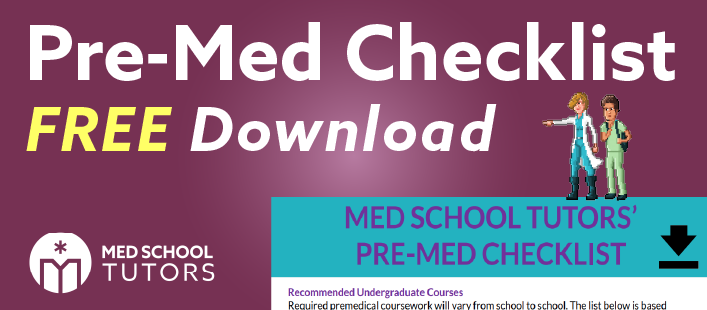Med School Tutors’ Pre-Med Checklist
- by
- Jan 12, 2021
- Reviewed by: Amy Rontal, MD

If you are thinking about going to medical school, there are a lot of things you will need to do while you are in undergrad including required coursework, research, clinical experience, and volunteering. This checklist is designed to be a starting point for students who want a general idea of where to start with these requirements. Please keep in mind that every student is different and every medical school may have different requirements.
Download the Pre-Med Checklist to keep it handy for your reference.
Recommended Undergraduate Courses
Required premedical coursework will vary from school to school. The list below is based upon what is recommended by the AAMC as well as what is most useful to prepare for the MCAT.
Most Likely Required
- 1-Year Biology (Cell Biology, Genetics, Anatomy and Physiology, and Microbiology)
- 2-Years Chemistry (General Chemistry, Organic Chemistry, and Biochemistry)
- 1-Year English
Recommended
- Introductory Physics
- Psychology
- Sociology
Clinical Experience, Research, and Volunteer Hours Requirements
Every medical school wants to see that you know and understand what it’s like to be a doctor. Your time outside of the classroom should be spent exploring the field as much as possible. The list below is a good starting point for the types of experiences you should pursue in each category to make sure that you are meeting most schools’ requirements.
- Clinical or Shadowing Experience (150 Hours) – Seek out opportunities early and pursue them over a period of 3-4 years. If you begin as a shadow, ask as time passes if you would be able to help with other activities in the office or hospital as a volunteer. If you aim for 2 hours per week for most of your sophomore and junior year of college, you will be well over 150 hours.
- Research (100 Hours) – Working in a lab during the summer is a great opportunity to get research experience. You can also use this time to work closely with some of your professors who will be writing your recommendation letters for medical school.
- Volunteering (150 Hours) – The key takeaway for volunteer hours is consistency and quality. Use this time to explore your interests and passions, and make sure to start early so you are not trying to cram this in your last year of undergrad. It’s normal to explore, but once you find an activity you are passionate about, stick with it.
MCAT Preparation
Most students plan on taking their MCAT during their junior year of college. We recommend at least 3-4 months of solid preparation to make sure you are ready as you should aim for at least a 510. It’s also wise to leave time to take your MCAT again in case you need to get a higher score, especially as you’ll be completing medical school applications during this time as well.









